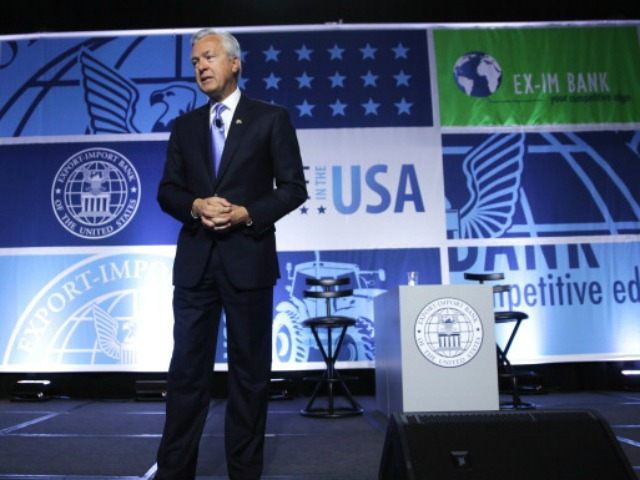A large block of House Republicans is working with Democrats to resurrect the Export-Import Bank, a New Deal-era federal agency benefiting the largest corporations. The Ex-Im Bank expired at the end of June, but has been resurrected through legislative efforts of Tennessee Republican Rep. Steve Filcher.
Rep. Filcher has been pushing a “discharge petition” which can force the House to consider legislation backed by a majority of the Congress. On Monday, Filcher’s petition passed the House, by a vote of 246-177, with 70 Republicans joined Democrats to reestablish the federal bank.
Few actions better highlight the wide gulf between Republican lawmakers in Washington and the party’s voters. The extraordinary actions by many Republicans to revive the Ex-Im Bank, considered by many to be little more than corporate welfare, explains the populist anger roiling the Republican Presidential nomination.
FDR created the Export-Import Bank during the Depression to provide federal-backed loans to overseas companies to purchase American goods. Because the loans are guaranteed by American taxpayers, they provide cheaper credit to foreign companies to buy goods sold by U.S. companies.
Whatever arguments existed during the Depression to justify the creation of the Bank no longer exist today. For the last, at least, 7 years, the world has been swimming in cheap credit. The European Central Bank has even instituted “negative interest rates” on bank deposits, encouraging even more lending.
If anything, access to easy credit is a threat, not an obstacle, to continued economic growth. At the very least, it is hard to argue that any company faces difficulty accessing credit for equipment purchases. There simply is no macro-economic need for the federal government to provide cheap loans these days.
Less than 2 percent of American exports are currently financed by loans underwritten by the Ex-Im Bank. It isn’t at all clear, moreover, whether these deals would even be threatened by the withdrawal of the taxpayer-backed loans.
While the Export-Import Bank may not have a big effect on the overall economy, it has a huge impact on very specific American companies. Around 75 percent of the bank’s loan subsidies benefited just 10 American mega-corporations. Almost half the benefits go to a single company, Boeing.
The benefits to Boeing, in particular, point to the problems arise from a federal agency assisting particular companies or foreign entities. The biggest recipients of Ex-Im loans to purchase Boeing equipment are foreign airlines, which then compete directly with American airline firms including Delta and United. Boeing may sell more planes, marginally, but American airlines then face increased competition from foreign companies purchasing aircraft at terms better than they could in open credit markets.
The federal government attempting to put its fingers on the scales of economic activity obviously invites potential abuse. Earlier this year, an Ex-Im Bank loan officer was convicted of accepting brides to authorize certain loans.
The Ex-Im Bank’s own Inspector General concluded that the Bank lacked sufficient guidelines to prevent waste and fraud and has poor record-keeping or risk management policies.
Republican donors, however, have made revival of the Bank a priority. The U.S. Chamber has said reauthorizing the Bank is one of its top issues and will partly guide its involvement in upcoming Republican primaries. The Chamber expects to spend $100 million during the 2016 elections, a large portion of which will be used to challenge conservatives opposed to the Bank.
Earlier this year, the National Association of Manufacturers announced it would no longer host fundraisers for lawmakers at its offices in D.C. The move was seen as a thinly veiled threat to withhold campaign contributions until the Ex-Im Bank is reauthorized. Other corporate groups have implied a similar threat.
Unfortunately, Republicans in Washington will heed these threats more than those of Republican voters frustrated and angry that DC is perpetuating a corrupt status quo. The rampant growth in the federal government, combined with the executive overreach of the Obama Administration, spurred voters to entrust Republicans with Congress to tame the federal leviathan.
There are, of course, limits to what Republicans can achieve without the White House. What particularly galls voters, though, is the impression that Republicans will fight much harder to expand government programs it favors than to rein in programs voters oppose.
The “discharge petition” in the House was used because Speaker Boehner and many in Republican leadership had blocked action on reviving the Ex-Im Bank. Seventy Republicans, then, took the extraordinary step of bucking their own leadership to help Democrats revive the corporate welfare agency.
When conservatives buck leadership to oppose an expansion of government they are condemned as irresponsible or unreasonable. When rank-and-file Republicans do the same to expand government they are lauded as being adults, interested in “governing.”
Little else is necessary to understand how anti-establishment candidates now command an overwhelming amount of support from Republican voters. Monday’s actions shows that Washington Republicans still haven’t gotten the message.

COMMENTS
Please let us know if you're having issues with commenting.